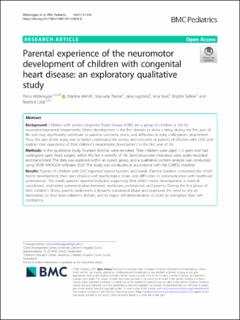Please use this identifier to cite or link to this item:
https://doi.org/10.21256/zhaw-25889Full metadata record
| DC Field | Value | Language |
|---|---|---|
| dc.contributor.author | Mitteregger, Elena | - |
| dc.contributor.author | Wehrli, Martina | - |
| dc.contributor.author | Theiler, Manuela | - |
| dc.contributor.author | Logoteta, Jana | - |
| dc.contributor.author | Nast, Irina | - |
| dc.contributor.author | Seliner, Brigitte | - |
| dc.contributor.author | Latal, Beatrice | - |
| dc.date.accessioned | 2022-10-28T13:07:02Z | - |
| dc.date.available | 2022-10-28T13:07:02Z | - |
| dc.date.issued | 2021 | - |
| dc.identifier.issn | 1471-2431 | de_CH |
| dc.identifier.uri | https://digitalcollection.zhaw.ch/handle/11475/25889 | - |
| dc.description.abstract | Background: Children with severe congenital heart disease (CHD) are a group of children at risk for neurodevelopmental impairments. Motor development is the first domain to show a delay during the first year of life and may significantly contribute to parental concerns, stress, and difficulties in early child-parent attachment. Thus, the aim of the study was to better understand the wishes and concerns of parents of children with CHD and explore their experience of their children’s neuromotor development in the first year of life. Methods: In this qualitative study, fourteen families were recruited. Their children were aged 1–3 years and had undergone open heart surgery within the first 6 months of life. Semi-structured interviews were audio-recorded and transcribed. The data was explored within an expert group, and a qualitative content analysis was conducted using VERBI MAXQDA software 2020. The study was conducted in accordance with the COREQ checklist. Results: Parents of children with CHD reported several burdens and needs. Parental burdens concerned the child’s motor development, their own physical and psychological strain, and difficulties in communication with healthcare professionals. The needs, parents reported included supporting their child’s motor development, a medical coordinator, and better communication between healthcare professionals and parents. During the first phase of their children’s illness, parents underwent a dynamic transitional phase and expressed the need to rely on themselves, to trust their children’s abilities, and to regain self-determination in order to strengthen their self-confidence. Conclusions: It is essential to involve parents of children with CHD at an early stage of decision-making. Parents are experts in their children and appreciate medical information provided by healthcare professionals. Interprofessional teamwork, partnering with parents, and continuous support are crucial to providing the best possible care for children and their families. Family-centred early motor intervention for CHD children might counteract the effect of parental overprotection and improve children’s motor development and thus strengthen child-parent interaction. In future work, we aim to evaluate a family-centred early motor intervention for children with CHD developed on the basis of this qualitative study. Trial registration: Not applicable. | de_CH |
| dc.language.iso | en | de_CH |
| dc.publisher | BioMed Central | de_CH |
| dc.relation.ispartof | BMC Pediatrics | de_CH |
| dc.rights | http://creativecommons.org/licenses/by/4.0/ | de_CH |
| dc.subject | Congenital heart disease | de_CH |
| dc.subject | Open heart surgery | de_CH |
| dc.subject | Infant | de_CH |
| dc.subject | Child | de_CH |
| dc.subject | Parental experience | de_CH |
| dc.subject | Motor development delay | de_CH |
| dc.subject | Burden | de_CH |
| dc.subject | Concern | de_CH |
| dc.subject | Qualitative study | de_CH |
| dc.subject.ddc | 618.92: Pädiatrie | de_CH |
| dc.title | Parental experience of the neuromotor development of children with congenital heart disease : an exploratory qualitative study | de_CH |
| dc.type | Beitrag in wissenschaftlicher Zeitschrift | de_CH |
| dcterms.type | Text | de_CH |
| zhaw.departement | Gesundheit | de_CH |
| zhaw.organisationalunit | Institut für Physiotherapie (IPT) | de_CH |
| dc.identifier.doi | 10.1186/s12887-021-02808-8 | de_CH |
| dc.identifier.doi | 10.21256/zhaw-25889 | - |
| dc.identifier.pmid | 34598680 | de_CH |
| zhaw.funding.eu | No | de_CH |
| zhaw.issue | 430 | de_CH |
| zhaw.originated.zhaw | Yes | de_CH |
| zhaw.publication.status | publishedVersion | de_CH |
| zhaw.volume | 21 | de_CH |
| zhaw.publication.review | Peer review (Publikation) | de_CH |
| zhaw.author.additional | No | de_CH |
| zhaw.display.portrait | Yes | de_CH |
| Appears in collections: | Publikationen Gesundheit | |
Files in This Item:
| File | Description | Size | Format | |
|---|---|---|---|---|
| 2021_Mitteregger-etal_Parental-experience-neuromotor-development-children-heart-disease.pdf | 850.62 kB | Adobe PDF |  View/Open |
Show simple item record
Mitteregger, E., Wehrli, M., Theiler, M., Logoteta, J., Nast, I., Seliner, B., & Latal, B. (2021). Parental experience of the neuromotor development of children with congenital heart disease : an exploratory qualitative study. BMC Pediatrics, 21(430). https://doi.org/10.1186/s12887-021-02808-8
Mitteregger, E. et al. (2021) ‘Parental experience of the neuromotor development of children with congenital heart disease : an exploratory qualitative study’, BMC Pediatrics, 21(430). Available at: https://doi.org/10.1186/s12887-021-02808-8.
E. Mitteregger et al., “Parental experience of the neuromotor development of children with congenital heart disease : an exploratory qualitative study,” BMC Pediatrics, vol. 21, no. 430, 2021, doi: 10.1186/s12887-021-02808-8.
MITTEREGGER, Elena, Martina WEHRLI, Manuela THEILER, Jana LOGOTETA, Irina NAST, Brigitte SELINER und Beatrice LATAL, 2021. Parental experience of the neuromotor development of children with congenital heart disease : an exploratory qualitative study. BMC Pediatrics. 2021. Bd. 21, Nr. 430. DOI 10.1186/s12887-021-02808-8
Mitteregger, Elena, Martina Wehrli, Manuela Theiler, Jana Logoteta, Irina Nast, Brigitte Seliner, and Beatrice Latal. 2021. “Parental Experience of the Neuromotor Development of Children with Congenital Heart Disease : An Exploratory Qualitative Study.” BMC Pediatrics 21 (430). https://doi.org/10.1186/s12887-021-02808-8.
Mitteregger, Elena, et al. “Parental Experience of the Neuromotor Development of Children with Congenital Heart Disease : An Exploratory Qualitative Study.” BMC Pediatrics, vol. 21, no. 430, 2021, https://doi.org/10.1186/s12887-021-02808-8.
Items in DSpace are protected by copyright, with all rights reserved, unless otherwise indicated.